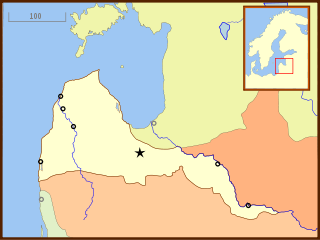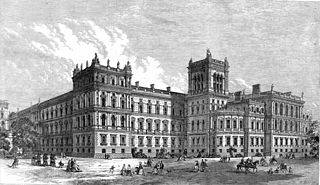
Bermuda is a British Overseas Territory in the North Atlantic Ocean. The closest land outside the territory is in the American state of North Carolina, approximately 1,035 km (643 mi) to the west-northwest.

The British Empire was composed of the dominions, colonies, protectorates, mandates, and other territories ruled or administered by the United Kingdom and its predecessor states. It began with the overseas possessions and trading posts established by England between the late 16th and early 18th centuries. At its height it was the largest empire in history and, for over a century, was the foremost global power. By 1913 the British Empire held sway over 412 million people, 23 per cent of the world population at the time, and by 1920 it covered 35,500,000 km2 (13,700,000 sq mi), 24 per cent of the Earth's total land area. As a result, its constitutional, legal, linguistic, and cultural legacy is widespread. At the peak of its power, it was described as "the empire on which the sun never sets", as the sun was always shining on at least one of its territories.

In political science, a colony is a territory subject to a form of foreign rule. Though dominated by the foreign colonizers, colonies remain separate from the administration of the original country of the colonizers, the metropolitan state . This administrative colonial separation makes colonies neither incorporated territories, nor client states. Some colonies have been organized either as dependent territories that are not sufficiently self-governed, or as self-governed colonies controlled by colonial settlers.

Colonialism is a practice or policy of control by one people or power over other people or areas, often by establishing colonies and generally with the aim of economic dominance. In the process of colonisation, colonisers may impose their religion, language, economics, and other cultural practices. The foreign administrators rule the territory in pursuit of their interests, seeking to benefit from the colonised region's people and resources. It is associated with but distinct from imperialism.

Imperialism is a policy or ideology of extending rule over people and other countries, for extending political and economic access, power and control, often through employing hard power, especially military force, but also soft power. While related to the concepts of colonialism and empire, imperialism is a distinct concept that can apply to other forms of expansion and many forms of government.

The Thirteen Colonies, also known as the Thirteen British Colonies, the Thirteen American Colonies, or later as the United Colonies, were a group of British colonies on the Atlantic coast of North America. Founded in the 17th and 18th centuries, they began fighting the American Revolutionary War in April 1775 and formed the United States of America by declaring full independence in July 1776.

The Stamp Act of 1765 was an act of the Parliament of Great Britain which imposed a direct tax on the British colonies in America and required that many printed materials in the colonies be produced on stamped paper produced in London, carrying an embossed revenue stamp. Printed materials included legal documents, magazines, playing cards, newspapers, and many other types of paper used throughout the colonies, and it had to be paid in British currency, not in colonial paper money.

The British Overseas Territories (BOTs), also known as United Kingdom Overseas Territories (UKOTs), are fourteen territories all with a constitutional and historical link with the United Kingdom. They are the last remnants of the former British Empire and do not form part of the United Kingdom itself. Some of the permanently inhabited territories are internally self-governing, with the UK retaining responsibility for defence and foreign relations. Three of the territories are inhabited only by a transitory population of military or scientific personnel. All but one of the rest are listed by the UN Special Committee on Decolonization as non-self-governing territories. All fifteen have the British monarch as head of state.

British North America comprised the colonial territories of the British Empire in North America from 1783 onwards. English colonisation of North America began in the 16th century in Newfoundland, then further south at Roanoke and Jamestown, Virginia, and more substantially with the founding of the Thirteen Colonies along the Atlantic Coast of North America.

Penal transportation or transportation was the relocation of convicted criminals, or other persons regarded as undesirable, to a distant place, often a colony, for a specified term; later, specifically established penal colonies became their destination. While the prisoners may have been released once the sentences were served, they generally did not have the resources to return home.
Decolonization or decolonisation is the undoing of colonialism, the latter being the process whereby a nation establishes and maintains its domination of foreign territories, often overseas territories. The concept particularly applies to the dismantlement, during the second half of the 20th century, of the colonial empires established prior to World War I throughout the world. Some scholars of decolonization focus especially on the movements in the colonies demanding independence, such as Creole nationalism.

Triangular trade or triangle trade is trade between three ports or regions. Triangular trade usually evolves when a region has export commodities that are not required in the region from which its major imports come. It thus provides a method for rectifying trade imbalances between the above regions.

The German colonial empire constituted the overseas colonies, dependencies and territories of Imperial Germany. Unified in the early 1870s, the chancellor of this time period was Otto von Bismarck. Short-lived attempts at colonization by individual German states had occurred in preceding centuries, but crucial colonial efforts only began in 1884 with the Scramble for Africa. Claiming much of the left-over uncolonized areas of Africa, Germany built the third-largest colonial empire at the time, after the British and French. The German Colonial Empire encompassed parts of several African countries, including parts of present-day Burundi, Rwanda, Tanzania, Namibia, Cameroon, Gabon, Congo, Central African Republic, Chad, Nigeria, Togo, Ghana, New Guinea and numerous other West Pacific / Micronesian islands.
A Crown colony or royal colony was a colony administered by The Crown within the British Empire. There was usually a Governor, appointed by the monarch of the UK on the advice of the Home (UK) Government, with or without the assistance of a local Council. In some cases this Council was split into two: an Executive Council and a Legislative Council, and was similar to the Privy Council that advises the Monarch. Members of Executive Councils were appointed by the Governors, and British citizens resident in Crown colonies either had no representation in local government, or limited representation. In several Crown colonies, this limited representation grew over time. As the House of Commons of the British Parliament has never included seats for any of the colonies, there was no direct representation in the sovereign government for British subjects or citizens residing in Crown colonies.

The Federation of Australia was the process by which the six separate British self-governing colonies of Queensland, New South Wales, Victoria, Tasmania, South Australia, and Western Australia agreed to unite and form the Commonwealth of Australia, establishing a system of federalism in Australia. The colonies of Fiji and New Zealand were originally part of this process, but they decided not to join the federation. Following federation, the six colonies that united to form the Commonwealth of Australia as states kept the systems of government that they had developed as separate colonies, but they also agreed to have a federal government that was responsible for matters concerning the whole nation. When the Constitution of Australia came into force, on 1 January 1901, the colonies collectively became states of the Commonwealth of Australia.

The decolonisation of Africa took place in the mid-to-late 1950s to 1975 during the Cold War, with radical regime changes on the continent as colonial governments made the transition to independent states. The process was often marred with violence, political turmoil, widespread unrest, and organised revolts in both northern and sub-Saharan countries including the Algerian War in French Algeria, the Angolan War of Independence in Portuguese Angola, the Congo Crisis in the Belgian Congo, the Mau Mau Uprising in British Kenya, and the Nigerian Civil War in the secessionist state of Biafra.

Couronian colonisation refers to the colonisation efforts of the Duchy of Courland and Semigallia, a vassal state of the Polish–Lithuanian Commonwealth. Small, but wealthy, the Duchy took a modest part in the European colonization settlement attempts of West Africa and the Caribbean.

In international relations, Françafrique is France's sphere of influence over former French and Belgian colonies in sub-Saharan Africa. The term was derived from the expression France-Afrique, which was used by the first president of Ivory Coast, Félix Houphouët-Boigny, in 1955 to describe his country's close ties with France. It was later renamed Françafrique by François-Xavier Verschave in 1998 to criticise the alleged corrupt and clandestine activities of various Franco-African political, economic and military networks.

British America comprised the colonial territories of the British Empire in the Americas from 1607 to 1783. These colonies were formally known as British America and the British West Indies before the Thirteen Colonies declared their independence in the American Revolutionary War (1775–1783) and formed the United States of America.

The Colonial Office was a government department of the Kingdom of Great Britain and later of the United Kingdom, first created to deal with the colonial affairs of British North America but required also to oversee the increasing number of colonies of the British Empire. Despite its name, the Colonial Office was never responsible for all Britain's Imperial territories; for example, protectorates fell under the purview of the Foreign Office, and British India was ruled by the East India Company until 1858, while the role of the Colonial Office in the affairs of the Dominions changed as time passed.















